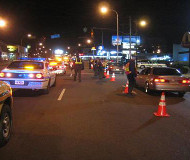1/7/2014
Pennsylvania: Lawsuit Filed Over Suspicionless Drug RoadblockFederal lawsuit and letter from US senator challenge the use of federal taxpayer dollars to set up drug testing roadblocks.

Recreational marijuana use became legal in Colorado on Wednesday, and Washington state will allow its use later this year. The spread of state laws decriminalizing possession has federal officials scrambling to come up with a way to test for drug use in the way breathalyzers are used to identify drunk drivers. To evaluate the available options, the Office of National Drug Control Policy and US Department of Transportation have been sponsoring "voluntary" roadblocks. According to a lawsuit filed in federal court on December 27, these roadblocks are not exactly voluntary.
On December 13, 2013, Ricardo Nieves was minding his own business, driving on the Bingham Street Bridge in Reading, Pennsylvania when he saw city police cruiser with its lights flashing and orange cones lining the street. He was flagged and directed to pull over in a parking lot. He had no choice but to comply. Once he was pulled over, a woman with a clipboard said she wanted to take a cheek swab to check for the presence of drugs in his saliva. If he consented he would be paid $10. Nieves refused. After trying to change his mind three times, the woman released Nieves.
The woman with the clipboard worked for the Pacific Institute for Research and Education which operates the roadblocks as part of an $8 million National Highway Traffic Safety Administration grant. The private firm's goal is to test 7500 drivers in total from sixty different locations. The lawsuit filed by Nieves seeks a permanent injunction against the Pacific Institute and the city of Reading to prevent the stops on the ground that they violate the Fourth Amendment. Aaron D. Martin, attorney for Nieves, argues that the program fails to meet any of the constitutional exceptions that the US Supreme Court says allows drunk driving roadblocks.
"Under Reading's Stop-and-Swab Policy, motorists are apparently not even stopped for the purpose of determining whether they are engaged in criminal activity, but rather for the purpose of gleaning information about their long-term driving habits," Martin wrote in a brief to the court. "If such a purpose can justify a suspicionless stop, one wonders what other survey subjects the city of Reading asserts are sufficiently compelling to justify the random stopping of vehicles. Inquiries into religious preferences? Television viewing habits? Sports team support?"
US Senator Dan Coats (R-Indiana) last month called on NHTSA to pull the plug on the program pending congressional hearings into the matter.
"I am extremely concerned that NHTSA is using federal dollars to both hire local uniformed police and conduct a checkpoint where DNA samples are taken through coercion from drivers stopped without probable cause," Coats wrote in a letter to NHTSA's administrator. "Since these checkpoints are being conducted through NHTSA, I urge you to immediately halt this program until it can be fully reviewed by Congress."


